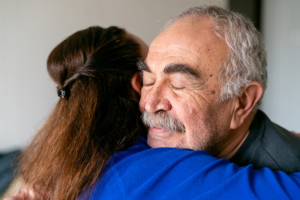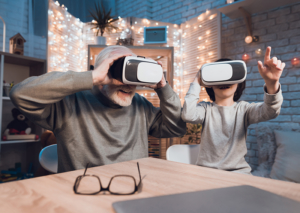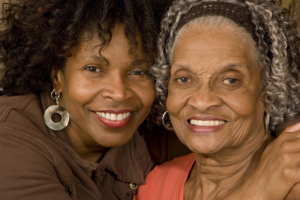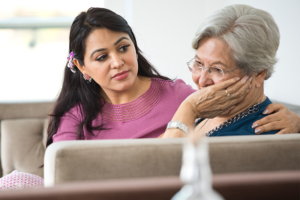Should You Rethink the Way You Approach Caring for a Loved One?

You may have doubts about others caring for a loved one, but here’s why it’s important to let others help.
“You can make it, but it’s easier if you don’t have to do it alone.” – Betty Ford
We all realize that no person is an island, something that especially holds true when caring for a loved one with dementia. Nonetheless many family caregivers falter with regards to asking for or accepting the help they need. As a result, stress is exacerbated, as there’s little if any time for self-care – something that is essential for any person in a caregiving role.
Why are we frequently so resolved to tackle such an extraordinary undertaking independently? Here are several common reasons and why we must rethink them:
- I am doing just fine on my own; I don’t need a break. To put it simply, science disagrees! A research study shared in the American Journal of Geriatric Psychiatry revealed that a certain stress hormone was depleted in caregivers whose stress was chronic and prolonged – such as in providing Alzheimer’s care independently – while those who engaged in just two days per week of respite care achieved a rise in the hormone as well as a brighter outlook and elevated mood.
- Mom would never want someone else taking care of her. Many of us would balk if we were told that someone was coming over to give us a bath. But having someone come and assist with housework and meals is a good approach to introduce a new caregiver, working your way up to additional necessary services once the caregiver is known and accepted. The phrasing you utilize tends to make a significant difference as well. Having a “salon day” sounds far more inviting, for instance.
- No one else could take care of Mom like I will. While you are certainly not replaceable, the purpose of enlisting help is certainly not replacement, but respite. A senior with Alzheimer’s can benefit through the socialization provided by someone other than yourself, while you gain the benefit of a much-needed break – ultimately allowing you to provide better care to the older adult when you return.
- It’s too time consuming to try and find a caregiver I will be able to trust. At Responsive Home Care, we background check and professionally train each one of our caregivers, confirming key character traits such as reliability, kindness, flexibility, and so much more. Responsive Home Care is insured and bonded, for your additional peace of mind. We also carefully match each older adult with the ideal caregiver who will be most compatible. Lastly, if an older adult’s primary caregiver is sick or on vacation, we will provide an equally qualified replacement caregiver.
If you’d like to explore in-home respite care for a senior you love with Alzheimer’s, connect with Responsive Home Care for caregiver services in Fort Lauderdale, FL or the surrounding area. Our professionally trained, experienced, creative, and compassionate caregivers are available to help you reduce stress, improve life for the senior you love, and provide you with the opportunity for self-care. Contact us at (954) 486-6440 to set up a free in-home assessment!

 Picture for a second how it could feel to struggle with the cognitive obstacles of Alzheimer’s disease. The people who are closest to you are no longer familiar. The words that would roll off your tongue without a second thought are now just beyond your grasp. In fact, the whole world as you once knew it has turned completely upside down, leaving you yearning for a recognizable foothold.
Picture for a second how it could feel to struggle with the cognitive obstacles of Alzheimer’s disease. The people who are closest to you are no longer familiar. The words that would roll off your tongue without a second thought are now just beyond your grasp. In fact, the whole world as you once knew it has turned completely upside down, leaving you yearning for a recognizable foothold.
